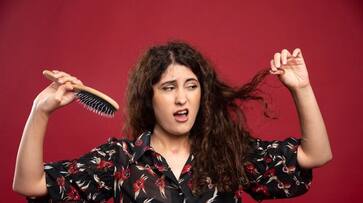Learn about the impact of vitamin deficiencies on hair loss. Also, find out how you can improve your diet to replenish vitamin levels in your body.
While many believe hair loss stems from using chemical-based shampoos or heat products, it's often linked to underlying health issues. Research shows that vitamin deficiency is a major contributor to hair loss. Let’s learn how lacking Vitamin A, D, E, C, Biotin, and Iron can worsen hair issues, and explore effective strategies to combat these deficiencies.
Biotin
Biotin is an important nutrient for hair growth. A deficiency in biotin can lead to significant hair loss. Moreover, iron deficiency and anaemia can also contribute to hair fall issues.
Vitamin A
A deficiency in Vitamin A can result in dry, lifeless hair and an increased problem of dandruff on the scalp. Consuming foods rich in Vitamin A, such as potatoes, carrots, and oranges, can help fulfil body’s requirement for Vitamin A.
Vitamin D
Vitamin D deficiency can contribute to hair loss. Even mild deficiency of Vitamin D can lead to thin and lifeless hair. In some cases, this deficiency may also cause swelling in the feet. For people dealing with this issue, it is advisable to consume foods rich in Vitamin D such as egg yolk, fish, or dairy products.
Vitamin E and C
Deficiency in Vitamin E or Vitamin C can worsen the problem of hair loss. Vitamin E is widely used in beauty care, while Vitamin C deficiency weakens the body's immunity, leading to increased hair fall. To combat Vitamin E deficiency, include foods like spinach, almonds, and avocado in your diet. For Vitamin C, consuming oranges and amla (Indian gooseberry) can help replenish your levels.
Last Updated Jul 15, 2024, 9:11 AM IST









![Salman Khan sets stage on fire for Anant Ambani, Radhika Merchant pre-wedding festivities [WATCH] ATG](https://static-gi.asianetnews.com/images/01hr1hh8y86gvb4kbqgnyhc0w0/whatsapp-image-2024-03-03-at-12-24-37-pm_100x60xt.jpg)
![Pregnant Deepika Padukone dances with Ranveer Singh at Anant Ambani, Radhika Merchant pre-wedding bash [WATCH] ATG](https://static-gi.asianetnews.com/images/01hr1ffyd3nzqzgm6ba0k87vr8/whatsapp-image-2024-03-03-at-11-45-35-am_100x60xt.jpg)


